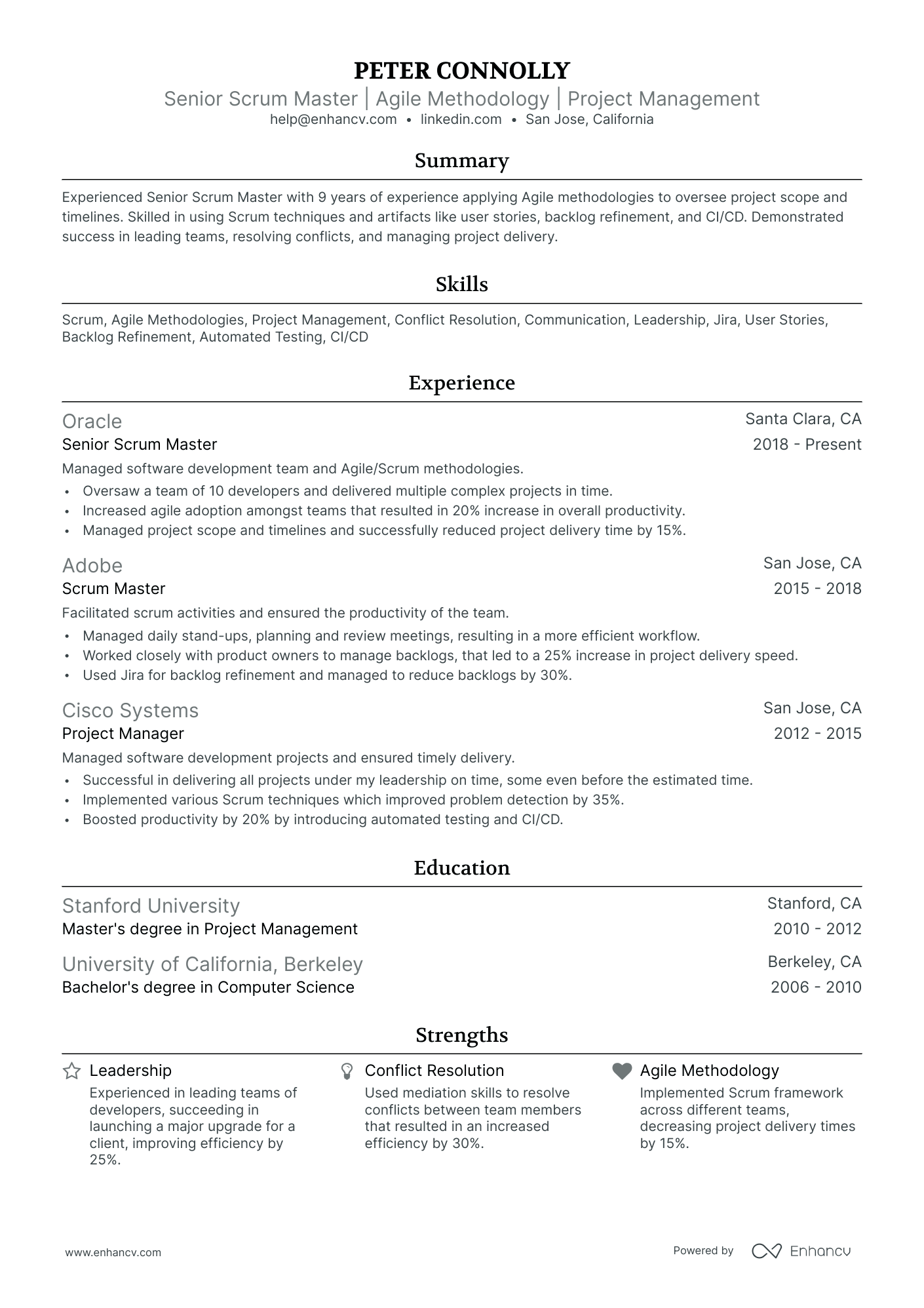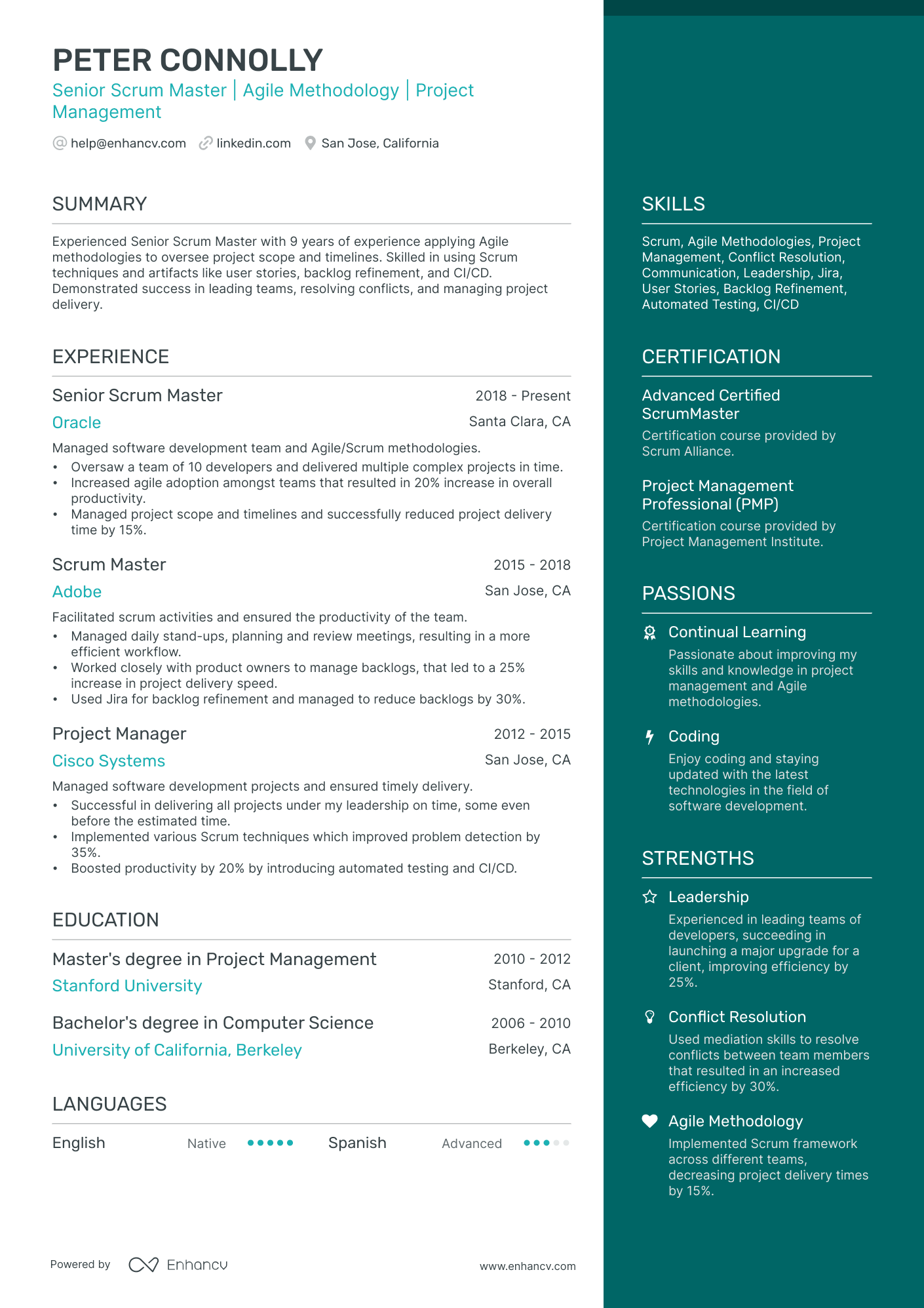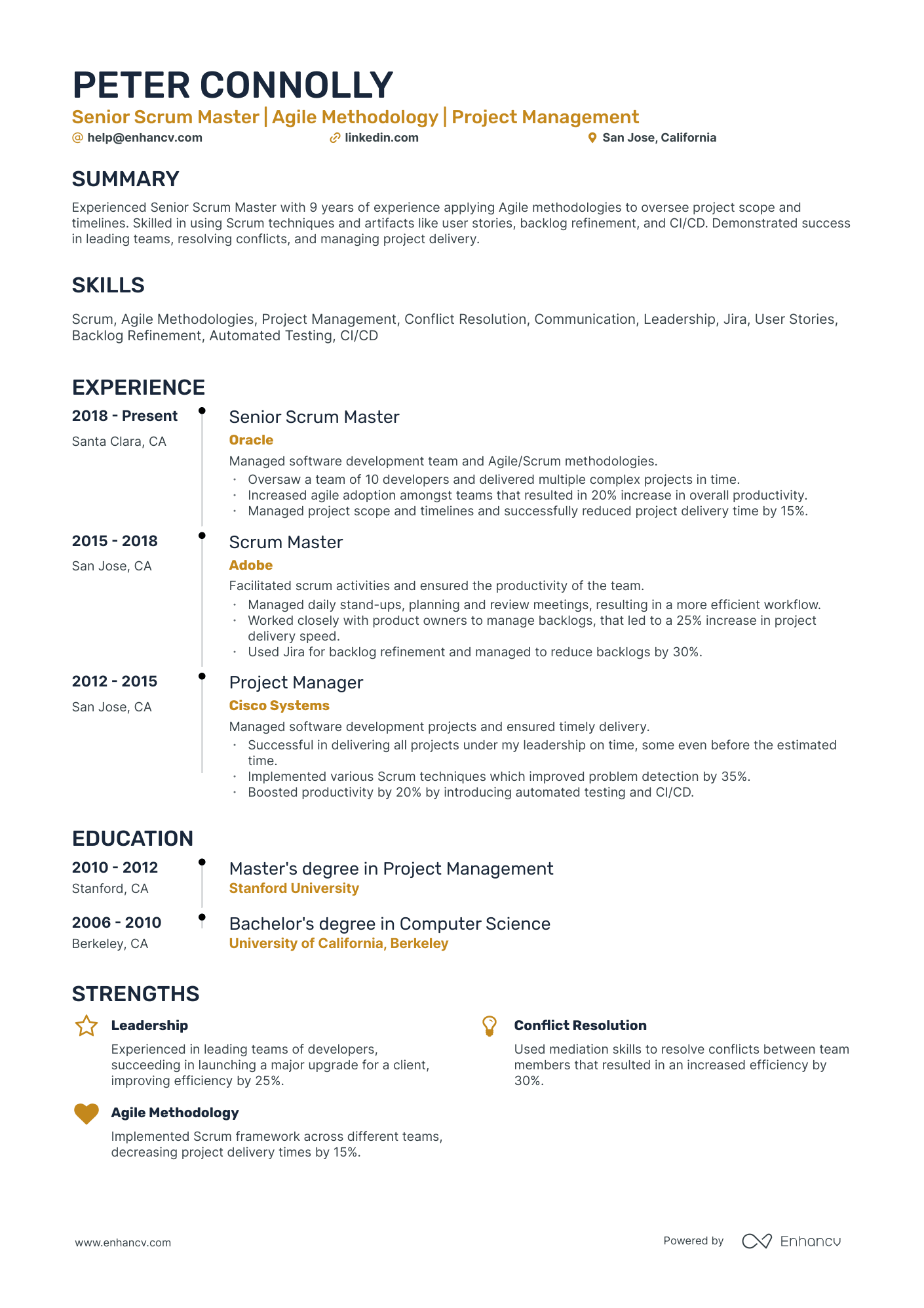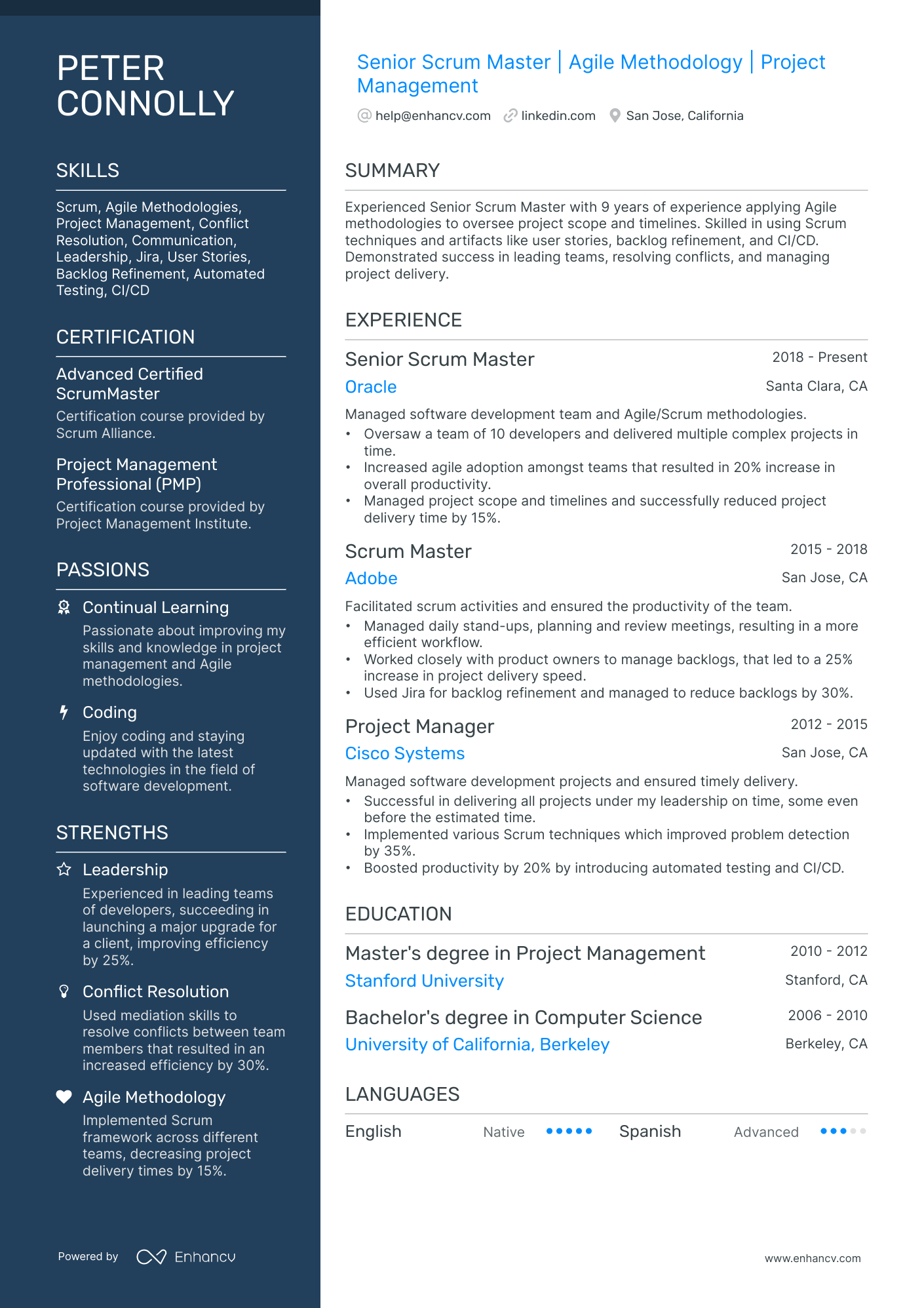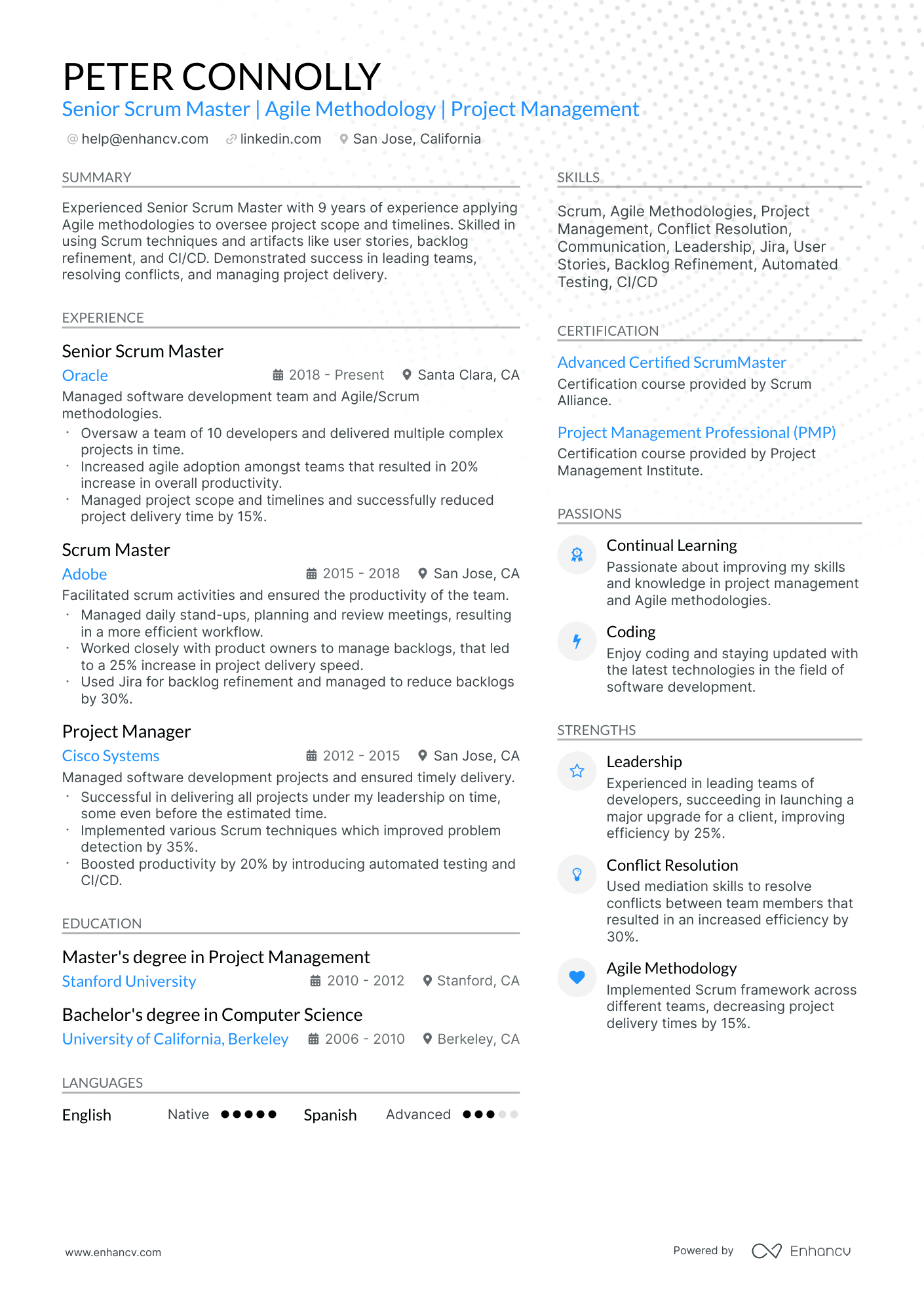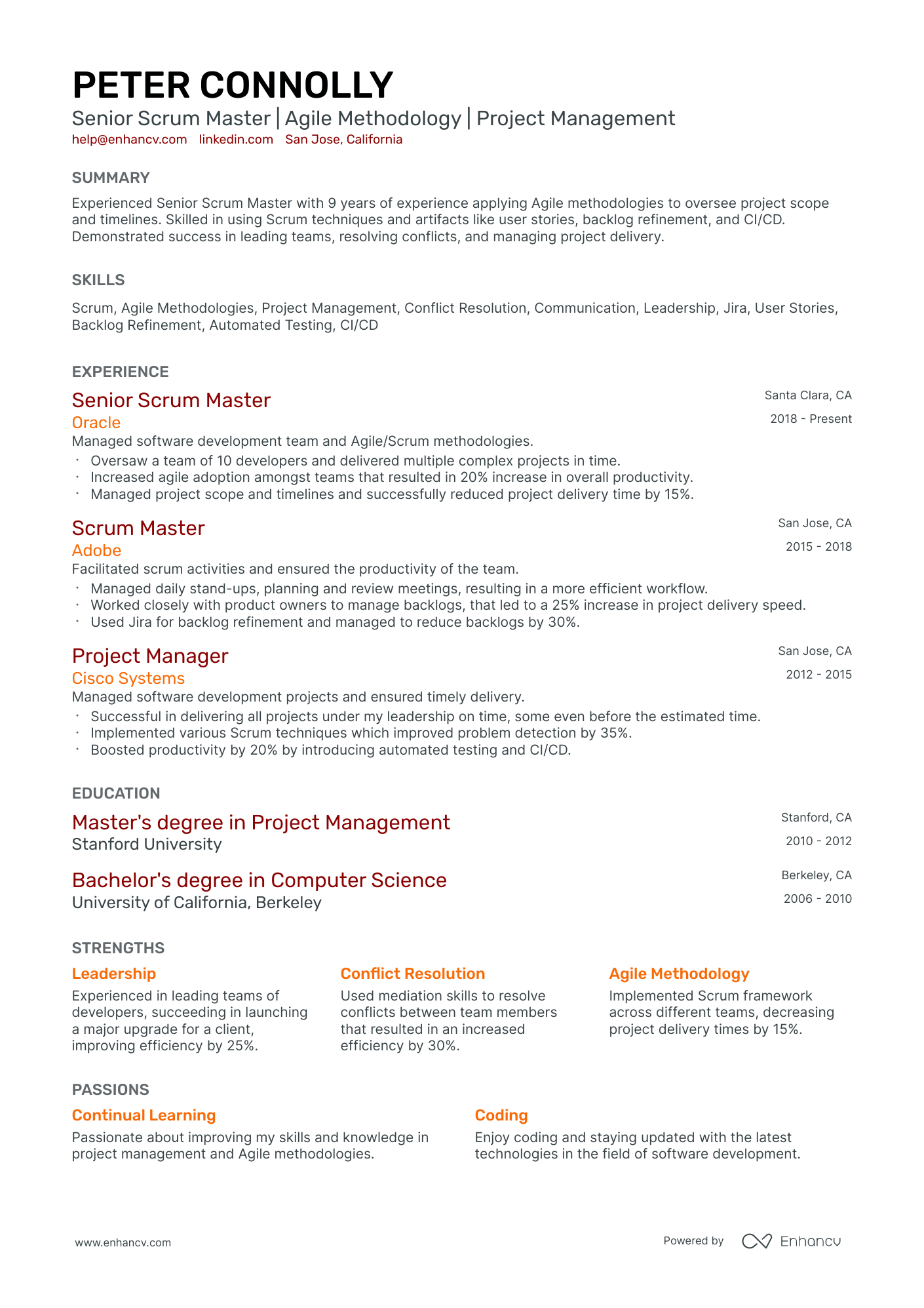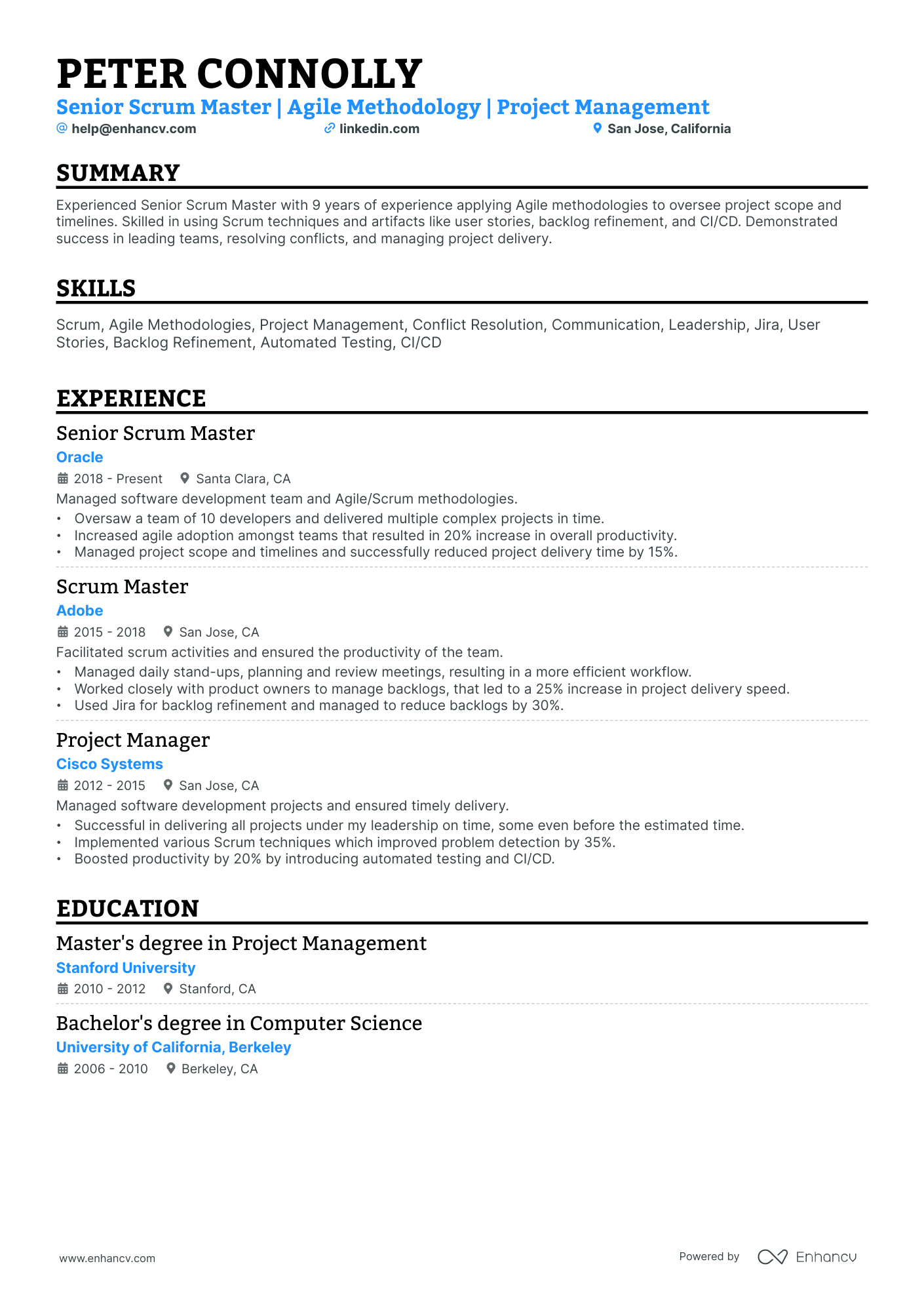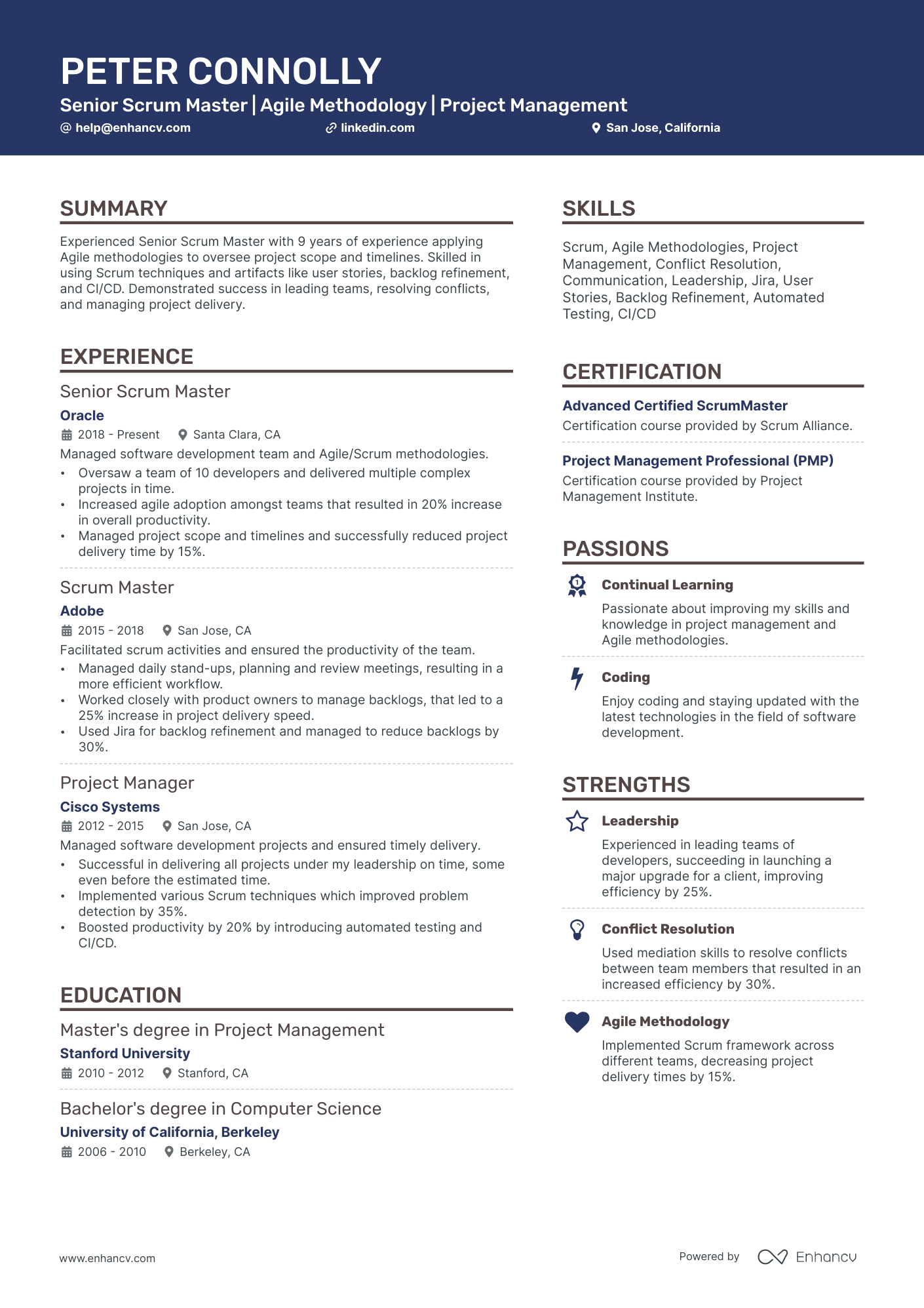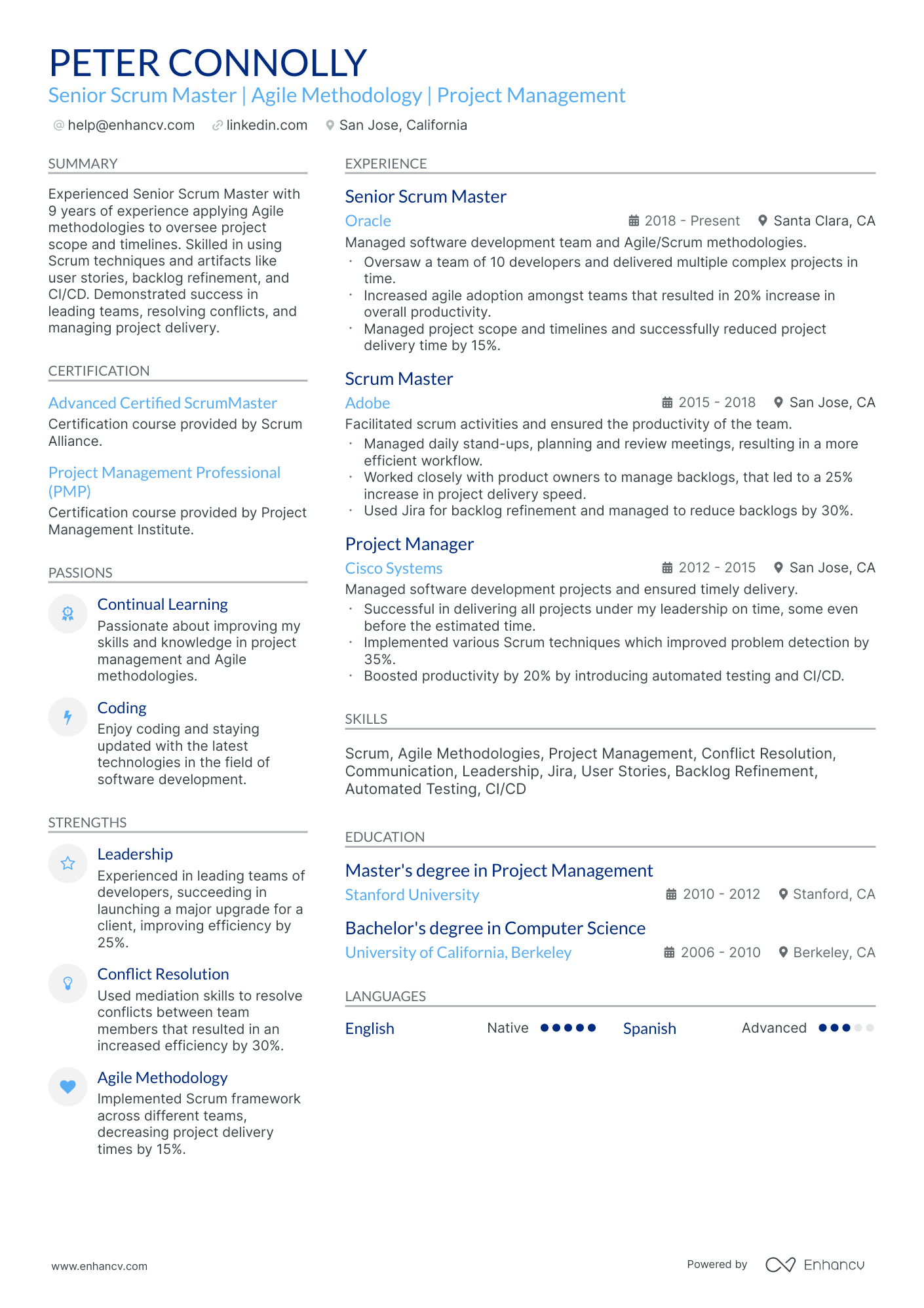Many senior Scrum Master resume drafts fail because they list ceremonies and tools instead of measurable delivery and leadership impact. In today's ATS filters and fast recruiter scans, a senior Scrum Master resume must surface outcomes immediately to compete.
A strong resume shows how you improved flow, alignment, and results across teams. Knowing how to make your resume stand out is critical—highlight reduced cycle time, higher sprint predictability, fewer escaped defects, faster release cadence, improved stakeholder satisfaction, and delivery across multiple teams or programs.
Key takeaways
- Use a reverse-chronological format to show leadership progression and growing organizational scope.
- Quantify delivery outcomes like cycle time, sprint predictability, and defect reduction in every bullet.
- Tailor experience bullets to mirror the exact frameworks, tools, and terminology in each job posting.
- Demonstrate skills through measurable achievements in your summary and experience, not just skills lists.
- Include certifications such as CSP-SM, PSM II, or SAFe to validate senior-level Agile credentials.
- Avoid hybrid or functional formats—they obscure the progressive impact senior roles require.
- Use Enhancv to turn routine responsibilities into quantified, recruiter-ready resume bullets faster.
How to format a senior Scrum Master Wait, let me reconsider. "Scrum" is a proper noun (a specific methodology/framework), so it should be capitalized. "Master" as part of the "Scrum Master resume
Recruiters evaluating senior Scrum Master candidates prioritize evidence of enterprise-level agile transformation leadership, coaching maturity across multiple teams, and measurable delivery improvements sustained over time. A reverse-chronological format ensures these signals—career progression, expanding scope, and strategic accountability—are immediately visible to both hiring managers and applicant tracking systems. Choosing the right resume layout further enhances readability and helps recruiters find key information quickly.
I have significant experience in this role—which format should I use?
Use a reverse-chronological format—it's the only structure that properly communicates the leadership trajectory and growing organizational impact expected at a senior Scrum Master level. Do:
- Lead with your most recent role and emphasize scope: number of teams coached, portfolio size, and cross-functional stakeholder relationships you owned.
- Highlight domain-specific expertise such as SAFe, LeSS, or Nexus frameworks, along with tools like Jira Align, Azure DevOps, or Rally, and specify the environments where you applied them (regulated industries, distributed teams, product-led organizations).
- Quantify business outcomes tied directly to your leadership—cycle time reductions, release frequency improvements, team maturity gains, or cost savings from process optimization.
Why hybrid and functional resumes don't work for senior roles
Hybrid formats fragment your career narrative by pulling key achievements out of their timeline context, making it difficult for reviewers to assess how your leadership scope and accountability grew across roles. Functional formats are even more problematic—they strip away progression entirely, obscuring the coaching maturity, organizational influence, and sustained delivery improvements that define a senior Scrum Master's value. Avoid both formats entirely when applying to senior or leadership-level Scrum Master positions, as they raise red flags about gaps or inconsistency in a career where demonstrable, progressive impact is the primary hiring signal.
- A functional format may be acceptable only if you're transitioning into a senior Scrum Master role from a related discipline (such as engineering management or program management) with limited formal Scrum Master titles—but even then, tie every listed skill to a specific project, team outcome, or measurable result.
With your format established, it's time to fill it with the right sections that showcase your senior Scrum Master expertise.
What sections should go on a senior Scrum Master Wait, let me reconsider. "Scrum" is a proper noun (a specific methodology/framework), so it should be capitalized. "Master" as part of the "Scrum Master resume
Recruiters expect a senior Scrum Master resume to highlight leadership across multiple teams, measurable delivery outcomes, and strong stakeholder management. Understanding what to put on a resume at this level ensures you include the right details without cluttering your document.
Use this structure for maximum clarity:
- Header
- Summary
- Experience
- Skills
- Projects
- Education
- Certifications
- Optional sections: Awards, Volunteering, Languages
Your experience bullets should emphasize impact, delivery outcomes, team and program scope, and measurable results.
Is your resume good enough?
Drop your resume here or choose a file. PDF & DOCX only. Max 2MB file size.
Now that you’ve identified the sections your senior Scrum Master resume needs, you can focus on writing your senior Scrum Master resume experience to show impact within each one.
How to write your senior Scrum Master Wait, let me reconsider. "Scrum" is a proper noun (a specific methodology/framework), so it should be capitalized. "Master" as part of the "Scrum Master resume experience
The experience section is where you prove you've driven meaningful results as a senior Scrum Master—not just facilitated ceremonies. Hiring managers prioritize demonstrated impact on team delivery, organizational agility, and continuous improvement over descriptive task lists of Scrum events you've run. Building a targeted resume ensures every bullet in this section speaks directly to what the hiring team needs.
Each entry should include:
- Job title
- Company and location (or remote)
- Dates of employment (month and year)
Three to five concise bullet points showing what you owned, how you executed, and what outcomes you delivered:
- Ownership scope: the teams, programs, value streams, or product areas you were accountable for coaching and guiding toward agile maturity.
- Execution approach: the agile frameworks, facilitation techniques, coaching models, or impediment-resolution strategies you used to improve how teams delivered work.
- Value improved: changes to sprint predictability, cycle time, release frequency, team health, or process efficiency that resulted directly from your interventions.
- Collaboration context: how you partnered with product owners, engineering leads, portfolio managers, or enterprise stakeholders to align delivery with business objectives.
- Impact delivered: outcomes expressed through improvements in delivery throughput, organizational agility adoption, or reduction in waste and dependencies—framed as results rather than activities.
Every bullet you write should tie back to what a senior Scrum Master uniquely owns: removing systemic impediments, elevating team performance, and embedding agile principles across the organization. Focus on the work you shipped, the frameworks you leveraged, and the measurable change you created.
Experience bullet formula
A senior Scrum Master Wait, let me reconsider. "Scrum" is a proper noun (a specific methodology/framework), so it should be capitalized. "Master" as part of the "Scrum Master experience example
✅ Right example - modern, quantified, specific.
Senior Scrum Master
BrightPay | Remote
2021–Present
Fintech SaaS platform supporting two million monthly active users across payroll, benefits, and compliance.
- Led three cross-functional Scrum teams (twenty-four engineers, designers, and product managers) to deliver forty-two roadmap initiatives, improving on-time delivery from 62% to 91% within two quarters.
- Reduced cycle time 28% by tightening sprint planning, refining definitions of ready and done, and improving backlog quality in Jira and Confluence.
- Improved release stability by cutting production incidents 35% through risk-based sprint goals, dependency mapping, and tighter integration with DevOps using Azure DevOps, GitHub, and ServiceNow.
- Increased sprint predictability by raising sprint goal success from 68% to 89% using flow metrics, Monte Carlo forecasting, and weekly stakeholder reviews with product, security, and compliance.
- Coached senior leaders and teams through a scaled Agile rollout, aligning quarterly planning across eight teams and reducing cross-team blockers 40% via a shared program board and facilitation cadence.
With your experience section structured around measurable impact, the next step is tailoring each bullet point to match the specific senior Scrum Master role you're targeting.
How to tailor your senior Scrum Master Wait, let me reconsider. "Scrum" is a proper noun (a specific methodology/framework), so it should be capitalized. "Master" as part of the "Scrum Master resume experience
Recruiters evaluate senior Scrum Master resumes through both human review and applicant tracking systems. Tailoring your resume to the job description increases your chances of passing both filters.
Ways to tailor your senior Scrum Master experience:
- Match Agile tools and platforms named in the job description.
- Mirror the exact Scrum framework terminology the posting uses.
- Reflect velocity or sprint throughput metrics the role prioritizes.
- Include SAFe or LeSS experience when large-scale delivery is specified.
- Highlight cross-functional team facilitation if collaboration is emphasized.
- Reference impediment resolution processes that align with stated workflows.
- Add domain experience in the industry the organization operates within.
- Emphasize coaching or mentoring responsibilities when team growth is mentioned.
Tailoring means aligning your real accomplishments with what the role demands—not forcing keywords where they don't belong.
Resume tailoring examples for senior Scrum Master Wait, let me reconsider. "Scrum" is a proper noun (a specific methodology/framework), so it should be capitalized. "Master" as part of the "Scrum Master
| Job description excerpt | Untailored | Tailored |
|---|
Once you’ve tailored your senior Scrum Master resume experience to the role, quantify your senior Scrum Master achievements to show the measurable impact behind those responsibilities.
How to quantify your senior Scrum Master Wait, let me reconsider. "Scrum" is a proper noun (a specific methodology/framework), so it should be capitalized. "Master" as part of the "Scrum Master achievements
Quantifying your achievements proves you improved delivery, quality, and predictability—not just facilitated meetings. Focus on sprint predictability, cycle time, defect leakage, release frequency, and risk reduction across teams, products, and stakeholders.
Quantifying examples for senior Scrum Master Wait, let me reconsider. "Scrum" is a proper noun (a specific methodology/framework), so it should be capitalized. "Master" as part of the "Scrum Master
| Metric | Example |
|---|---|
| Sprint predictability | "Improved sprint goal completion from 62% to 88% across three squads by tightening refinement, using Jira dashboards, and enforcing clear Definition of Done." |
| Cycle time | "Cut median cycle time from 14 days to nine days by introducing work-in-progress limits and unblocking dependencies through weekly cross-team syncs." |
| Defect leakage | "Reduced production defect leakage by 35% by adding automated regression gates in Azure DevOps and aligning QA and developers on acceptance criteria." |
| Release throughput | "Increased release frequency from monthly to biweekly for a 12-service platform by coordinating Scrum of Scrums and standardizing release checklists." |
| Risk reduction | "Lowered blocked work items from 18% to 7% by implementing a dependency board and escalating risks within 24 hours to product and engineering leaders." |
Turn your everyday tasks into measurable, recruiter-ready resume bullets in seconds with Enhancv's Bullet Point Generator.
Once your bullet points clearly showcase your impact, it's essential to pair them with the right hard and soft skills on your senior Scrum Master resume.
How to list your hard and soft skills on a senior Scrum Master Wait, let me reconsider. "Scrum" is a proper noun (a specific methodology/framework), so it should be capitalized. "Master" as part of the "Scrum Master resume
Your skills section shows how you enable predictable delivery and continuous improvement, and recruiters and an ATS (applicant tracking system) scan them to confirm role fit; most senior Scrum Master resumes emphasize hard skills related to delivery with a strong layer of facilitation and leadership soft skills. senior Scrum Master roles require a blend of:
- Product strategy and discovery skills.
- Data, analytics, and experimentation skills.
- Delivery, execution, and go-to-market discipline.
- Soft skills.
Your skills section should be:
- Scannable (bullet-style grouping).
- Relevant to the job post.
- Backed by proof in experience bullets.
- Updated with current tools.
Place your skills section:
- Above experience if you're junior or switching careers.
- Below experience if you're mid/senior with strong achievements.
Hard skills
- Scrum, Kanban, Lean
- Scaled Agile Framework (SAFe)
- Jira, Confluence, Azure DevOps
- Backlog refinement, story slicing
- Estimation: planning poker, T-shirt sizing
- Sprint planning, reviews, retrospectives
- Release planning, dependency management
- OKRs, outcome metrics
- Value stream mapping
- Risk, impediment, RAID logs
- Burndown, velocity, cycle time
- Incident management, postmortems
Soft skills
- Facilitate high-stakes workshops
- Align stakeholders on priorities
- Coach teams through change
- Remove blockers through influence
- Challenge scope with data
- Mediate conflict to resolution
- Communicate tradeoffs clearly
- Drive accountability without authority
- Build psychological safety norms
- Negotiate commitments and capacity
- Escalate risks at the right time
- Lead continuous improvement cadences
How to show your senior Scrum Master Wait, let me reconsider. "Scrum" is a proper noun (a specific methodology/framework), so it should be capitalized. "Master" as part of the "Scrum Master skills in context
Skills shouldn't appear only in isolated lists. Explore curated resume skills examples to see how top candidates present their competencies effectively.
They should be demonstrated in:
- Your summary (high-level professional identity)
- Your experience (proof through outcomes)
Here's what that looks like in practice.
Summary example
Senior Scrum Master with 8+ years leading agile transformations in fintech. Skilled in SAFe, Jira, and cross-functional facilitation. Coached 12 teams through Scrum adoption, improving sprint velocity by 35% and reducing release cycle times by 20%.
- Reflects senior-level depth clearly
- Names specific frameworks and tools
- Quantifies impact with real metrics
- Highlights coaching and facilitation skills
Experience example
Senior Scrum Master
Helix Financial Technologies | Remote
Jan 2019–Present
- Facilitated sprint ceremonies for four cross-functional teams using Jira and Confluence, increasing on-time delivery by 28%.
- Coached product owners and developers on Scrum best practices, reducing backlog refinement time by 40% within six months.
- Led a SAFe implementation across three departments, aligning 60+ stakeholders and cutting quarterly planning overhead by 15 hours.
- Every bullet includes a measurable outcome
- Skills surface naturally through real achievements
Now that you’ve shown your senior Scrum Master skills in context, you can apply the same approach to write a senior Scrum Master resume with no experience in a way that stays specific and credible.
How do I write a senior Scrum Master Wait, let me reconsider. "Scrum" is a proper noun (a specific methodology/framework), so it should be capitalized. "Master" as part of the "Scrum Master resume with no experience
Even without full-time experience, you can demonstrate readiness through the strategies outlined in our guide on writing a resume without work experience:
- Volunteer Scrum Master for nonprofit team
- Capstone project Agile delivery lead
- Internal hackathon sprint facilitator role
- Product launch coordination using Scrum
- Agile coaching for student teams
- Backlog refinement workshops you led
- Scrum simulation or case competition
- Community of practice facilitation
Focus on:
- Outcomes from sprint delivery metrics
- Evidence of cross-functional facilitation
- Backlog, roadmap, and release alignment
- Tools and artifacts used correctly
Resume format tip for entry-level senior Scrum Master
Use a hybrid resume format because it highlights Scrum Master projects and results while keeping your work history clear and scannable. Do:
- Lead with a "Scrum Master Projects" section.
- Add metrics to every project bullet.
- List tools, artifacts, and ceremonies used.
- Include stakeholder and team size details.
- Tie each project to a product outcome.
- Senior Scrum Master for volunteer nonprofit web rebuild, facilitated eight sprints in Jira, improved on-time story completion from 62% to 85% within six weeks.
Even without direct experience, your education section can reinforce the Agile knowledge and relevant credentials that make you a strong Scrum Master candidate.
How to list your education on a senior Scrum Master Wait, let me reconsider. "Scrum" is a proper noun (a specific methodology/framework), so it should be capitalized. "Master" as part of the "Scrum Master resume
Your education section helps hiring teams confirm foundational knowledge in project management, Agile principles, or related disciplines. It adds credibility alongside your hands-on experience leading Scrum teams.
Include:
- Degree name
- Institution
- Location
- Graduation year
- Relevant coursework (for juniors or entry-level candidates)
- Honors & GPA (if 3.5 or higher)
Skip month and day details—list the graduation year only.
Here's a strong education entry tailored to a senior Scrum Master resume:
Example education entry
Master of Science in Information Systems
Georgetown University, Washington, D.C.
Graduated 2016
GPA: 3.8/4.0
- Relevant coursework: Agile Project Management, Systems Analysis, Organizational Leadership
- Honors: Dean's List, Beta Gamma Sigma Honor Society
How to list your certifications on a senior Scrum Master Wait, let me reconsider. "Scrum" is a proper noun (a specific methodology/framework), so it should be capitalized. "Master" as part of the "Scrum Master resume
Certifications on your resume show your commitment to learning, prove tool proficiency, and confirm industry relevance for a senior Scrum Master. They also help recruiters quickly validate your Agile and delivery credentials.
Include:
- Certificate name
- Issuing organization
- Year
- Optional: credential ID or URL
- Place certifications below education when they're older, not role-specific, or mainly academic complements.
- Place certifications above education when they're recent, highly relevant to Scrum leadership, or required by target roles.
Best certifications for your senior Scrum Master Wait, let me reconsider. "Scrum" is a proper noun (a specific methodology/framework), so it should be capitalized. "Master" as part of the "Scrum Master resume
- Certified ScrumMaster (CSM)
- Advanced Certified ScrumMaster (A-CSM)
- Certified Scrum Professional—ScrumMaster (CSP-SM)
- Professional Scrum Master I (PSM I)
- Professional Scrum Master II (PSM II)
- SAFe Scrum Master (SSM)
- PMI Agile Certified Practitioner (PMI-ACP)
Once you’ve listed your certifications clearly, write your senior Scrum Master resume summary to connect those credentials to your strongest, most relevant impact.
How to write your senior Scrum Master Wait, let me reconsider. "Scrum" is a proper noun (a specific methodology/framework), so it should be capitalized. "Master" as part of the "Scrum Master resume summary
Your resume summary is the first thing a recruiter reads. A strong one immediately signals you're qualified and worth a closer look.
Keep it to three to four lines, with:
- Your title and total years of Scrum Master experience.
- The domain or industry you've worked in, such as fintech, healthcare, or e-commerce.
- Core frameworks and tools like SAFe, Kanban, Jira, or Confluence.
- One or two quantified achievements that show organizational impact.
- Soft skills tied to real outcomes, such as coaching teams or resolving cross-team dependencies.
PRO TIP
At the senior level, lead with outcomes, ownership, and scope of influence. Highlight how you've scaled agile practices across multiple teams or departments. Avoid generic traits like "passionate" or "motivated self-starter." Instead, show how your coaching or facilitation directly improved delivery speed, team health, or stakeholder alignment.
Example summary for a senior Scrum Master Wait, let me reconsider. "Scrum" is a proper noun (a specific methodology/framework), so it should be capitalized. "Master" as part of the "Scrum Master
Senior Scrum Master with eight years of experience leading agile transformations in fintech. Coached six cross-functional teams through SAFe adoption, reducing release cycles by 35%. Skilled in stakeholder alignment and removing systemic delivery blockers.
Optimize your resume summary and objective for ATS
Drop your resume here or choose a file.
PDF & DOCX only. Max 2MB file size.
With your summary showcasing your Agile leadership value, make sure your resume header presents the essential contact and professional details that get you noticed first.
What to include in a senior Scrum Master Wait, let me reconsider. "Scrum" is a proper noun (a specific methodology/framework), so it should be capitalized. "Master" as part of the "Scrum Master resume header
A resume header is the top section that lists your identity and contact details, and it matters for a senior Scrum Master because it drives visibility, credibility, and recruiter screening.
Essential resume header elements
- Full name
- Tailored job title and headline
- Location
- Phone number
- Professional email
- GitHub link
- Portfolio link
A LinkedIn link helps recruiters verify experience quickly and supports faster screening.
Do not include a photo on a senior Scrum Master resume unless the role is explicitly front-facing or appearance-dependent.
Keep your header to two lines, match the job title to the posting, and use links that open directly to active profiles.
Senior Scrum Master Wait, let me reconsider. "Scrum" is a proper noun (a specific methodology/framework), so it should be capitalized. "Master" as part of the "Scrum Master resume header
Jordan Lee
Senior Scrum Master | Agile delivery in regulated and cross-functional teams
Austin, TX | (512) 555-01XX | jordan.lee@enhancv.com github.com/jordanlee yourwebsite.com linkedin.com/in/jordanlee
Once you’ve covered the essential details in your senior Scrum Master resume header, add targeted additional sections to reinforce your qualifications and give hiring managers more context.
Additional sections for senior Scrum Master Wait, let me reconsider. "Scrum" is a proper noun (a specific methodology/framework), so it should be capitalized. "Master" as part of the "Scrum Master resumes
Once your core sections are solid, additional sections can set you apart by showcasing depth, thought leadership, and community involvement.
- Certifications (CSP-SM, SAFe, ICAgile, PMI-ACP)
- Publications and speaking engagements
- Agile community contributions and mentorship
- Languages
- Professional affiliations and board memberships
- Volunteer coaching or nonprofit Agile work
- Hobbies and interests
Beyond these additional resume sections, a well-crafted cover letter lets you contextualize your senior Scrum Master experience and connect your qualifications directly to the hiring team's needs.
Do senior Scrum Master Wait, let me reconsider. "Scrum" is a proper noun (a specific methodology/framework), so it should be capitalized. "Master" as part of the "Scrum Master resumes need a cover letter
A cover letter isn't required for a senior Scrum Master, but it often helps in competitive searches or process-heavy organizations. If you're unfamiliar with the format, start by understanding what a cover letter is and how it complements your resume. It can clarify fit, show impact, and answer questions a resume can't address.
Use a cover letter to add value in these cases:
- Explain role and team fit: Match your approach to the team's maturity, delivery model, and leadership style.
- Highlight one or two outcomes: Share a project result with clear metrics, such as cycle time, predictability, quality, or stakeholder alignment.
- Show product and business understanding: Connect your facilitation choices to users, product goals, and business constraints.
- Address transitions or non-obvious experience: Explain changes in industry, gaps, consulting work, or blended roles, and tie them to the senior Scrum Master role.
Drop your resume here or choose a file.
PDF & DOCX only. Max 2MB file size.
Once you’ve clarified when a senior Scrum Master resume needs a cover letter, you can use AI to strengthen that resume faster and more consistently because you’ll know which elements must stand on their own.
Using AI to improve your senior Scrum Master Wait, let me reconsider. "Scrum" is a proper noun (a specific methodology/framework), so it should be capitalized. "Master" as part of the "Scrum Master resume
AI can sharpen your resume's clarity, structure, and impact. It's great for tightening language and surfacing measurable results. But overuse can strip away authenticity. If you're wondering which AI is best for writing resumes, start with tools that let you stay in control of your content. Once your content feels clear and role-aligned, step away from AI.
Here are 10 practical prompts you can copy and paste to strengthen specific sections:
Sharpen the summary
Quantify experience bullets
Strengthen action verbs
Align skills strategically
Tighten project descriptions
Improve certification placement
Refine education section
Eliminate redundancy
Tailor for ATS
Add coaching impact
Conclusion
A strong senior Scrum Master resume proves impact with numbers and keeps the story easy to scan. Highlight outcomes like faster cycle time, improved predictability, reduced defects, and higher team throughput. Pair results with role-specific skills in coaching, facilitation, and impediment removal.
Use a clear structure with a focused summary, measurable experience, and relevant tools and certifications. Show leadership across multiple teams and complex delivery environments. This approach matches today’s hiring market and signals you can drive consistent delivery now.
